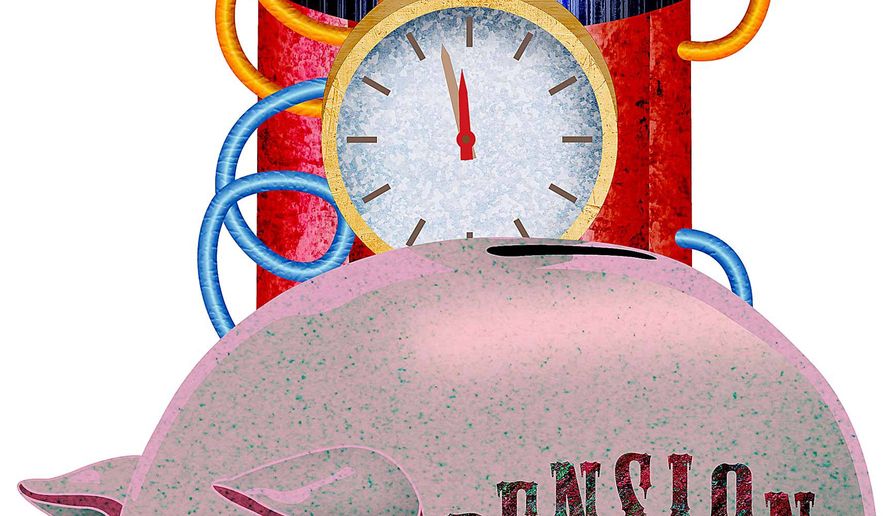OPINION:
When both Democratic and Republican lawmakers recently joined together to support a taxpayer-funded, multibillion-dollar bailout of big union pension funds, you didn’t need to be a “swamp” creature to know something has gone terribly wrong in Washington, D.C.
But that is exactly what happened when U.S. Rep. Richard Neal, Massachusetts Democrat, chairman of the Ways & Means Committee, offered a so-called bipartisan plan to address the pension crisis. However, this proposed bailout of organized labor’s retirement plans would cost federal taxpayers billions — while setting a dangerous precedent that would expose taxpayers and laborers to more financial mischief.
The expectation for this type of bailout is presumably why labor unions as well as the public sector still offer traditional pensions, while the rest of the United States has largely moved to 401(k) plans.
In a pension plan, employees earn pension benefits and receive monthly checks when they retire. Corporations have long understood that “over-promising” pensions to their employees is financially reckless and will come back to bite them, and so have embraced 401(k) plans instead. Yet neither labor unions nor state and local governments seem to care as much about the risks of making irresponsible and unfunded pension promises.
Why? First, lighter regulation allows these entities to delay addressing pension problems much more than corporations, by “kicking the can down the road.” Second, with their lobbying operations, they count on congressional lawmakers passing the bill to taxpayers for the promises they cannot keep. Union and government officials are adept at using congressional testimonies and meetings to exploit the workers to whom they have promised unrealistic benefits — and federal politicians seem to have no choice but to give them taxpayer money. Plus, the unions and public employees are powerful voting blocs.
Mr. Neal’s plan to address “multiemployer” pension plans — private-sector arrangements between firms and labor unions such as the Teamsters or United Mine Workers — would be catastrophic to adopt. These pension plans cover around 10 million individuals, and measured properly they faced a funding hole of $722 billion as of 2016.
In their current condition, many of these plans are comparable to Ponzi schemes in how they count on unrealistic investment earnings and future contributions to fund all the employer’s promises.
Mr. Neal’s bill would create a Pension Rehabilitation Administration within the Treasury Department that would be authorized to issue bonds in order to finance loans to multiemployer pension plans on the brink of fiscal disaster.
The loan approach is based on the idea that if the plans get a low-interest loan from the government, and then invest the proceeds in risky assets and target a high return, the loan can be repaid in full. Mr. Neal argues that this proposal does not constitute a bailout because “the federal government is simply backstopping the risk.”
But the loan program is in effect a taxpayer bailout. Ultimately, the taxpayers lose if the plans do not return to fiscal health.
In fact, the proposal now in Congress is similar to disastrous pension obligation bond issues under which state and local governments went on to sell bonds to the public and put the proceeds at risk in investments that they hoped would earn high returns.
Union and employer representatives who serve as trustees of these multiemployer pension plans have chosen not to make the difficult choices. Anticipation of a federal bailout encourages this irresponsible behavior.
Rather than pass pension bailout plans, Congress needs to establish rules that require at-risk pension plans to immediately stop making new promises before any federal assistance is extended. Such rules already apply to single-employer pension plans, so that unlike unions, companies with troubled pension plans have a strong incentive to go with 401(k)’s instead.
If there is federal assistance, it should be as part of a resolution process in which troubled pension plans are wound down. In addition, union plans should be required to measure liabilities accurately.
Mr. Neal’s bailout plan does not require any of these conditions. It sets a terrible precedent for a bigger, looming problem: Underfunded state and local government pensions. These public plans cover around 30 million active and retired cops, firefighters, teachers, etc. and are run by state and local governments.
According to both my calculations and those of the Federal Reserve, these promises were underfunded by $4 trillion as of 2016. States like Illinois, New Jersey and Connecticut, where pension obligations pose a serious threat to public finances, may conclude their pension promises to school teachers and public safety officials will be bailed out, too.
While Congress understandably wants to find ways of protecting hard-working people hurt by pension defaults, the proposed legislation would only exacerbate the pension problems.
Congress should act now to protect taxpayers from the consequences of irresponsible financial behavior by unions and state officials.
• Joshua Rauh is director of research and senior fellow at the Hoover Institution, and a professor of finance at the Stanford Graduate School of Business.




Please read our comment policy before commenting.